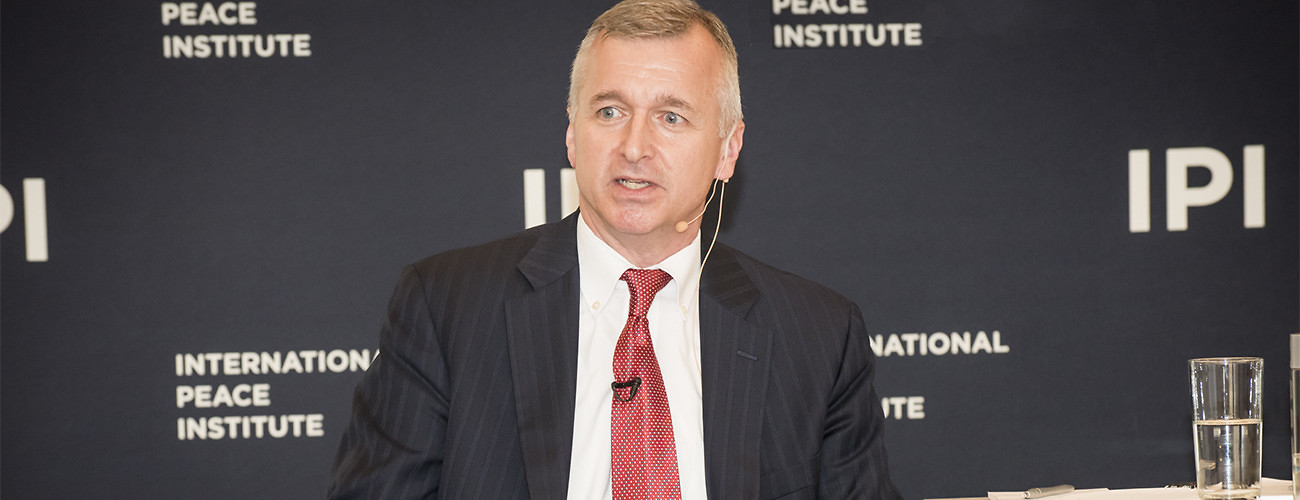The US has reasons to be invested in the success of rival superpower China and should be wary of the consequences for the US of Chinese failure. This was a key point of Thomas J. Christensen’s book The China Challenge: Shaping the Choices of a Rising Power, which he discussed at an IPI Distinguished Author Series event on June 22.
In what is the critical bilateral relationship of the 21st century, China is seen as a rival superpower to the United States, and many imagine the country’s rise to be a threat to US leadership in Asia and beyond. In the newly released book, Mr. Christensen argues against this zero-sum vision, describing instead a new paradigm in which the real challenge lies in dissuading China from regional aggression while encouraging the country to contribute to the global order.
“I don’t think China is going to replace the United States as a leading global superpower anytime soon,” he said, arguing against the notion that China is trying to drive the US out of the East Asia region.
The challenge, on the security front, is for the US to dissuade China from settling its many differences with its neighbors through the use of coercion or force, Mr. Christensen said.
“China is not a peer competitor of the United States in overall power at this time,” he added, “but you don’t have to be a peer competitor of the leading power to pose all sorts of challenges for that power.”
The big challenge for US diplomacy is to promote global governance in a world that is more tightly interdependent than ever before, he argued. This means that relatively small perturbations around the world can upset the entire global system, he said, and in order to solve the global governance problems, all the great powers in the world need to pull in a positive direction.
“Globalization is such that we need China to pitch in actively to solve global problems,” he said, whether it’s nonproliferation, financial instability, civil conflicts, humanitarian disasters, or global climate change. “But getting a developing country to think long term and to contribute to stability in far flung places in the world in many cases is very difficult, and the US diplomatic establishment doesn’t have lot of experience in getting that task done.”
On the security front, the big question is how China will manage its points of frictions with neighbors, Mr. Christensen contended, highlighting China’s advancements in conventional and nuclear modernization and cyber capabilities.
“China’s goal here with this modernization drive is not to dominate the region, not to drive the United States out, but to deter the United States from intervening in issues that China believes it cares about more than the United States or its allies,” he said.
How to dissuade China from using force to settle its many dispute will not be easy, he noted. “As China develops its new capabilities, China can bring more leverage to bear in those disputes.”
Domestic politics also makes China difficult to work with, he asserted, adding that the Chinese government is concerned about domestic stability and producing jobs.
It’s key to remember that China is the most important, most powerful developing country ever, the author argued. “If a country the size of China, despite all its domestic challenges, does not contribute actively to global governance, we’re going to have a lot of trouble solving problems.”
As an example, he pointed out that China is the biggest emitter of greenhouse gases. If the East Asian powerhouse is not on board on any international climate agreement, he said, the agreement will fail on physical and political grounds.
“The key is to shape China’s choices so that it seeks national greatness through cooperation,” he said, “rather than coercion.”
China is suspicious of western interventions, believing that the purpose of US policies is to weaken and hold down China and change regimes Washington doesn’t like. Instead, he said, the way to gain Chinese cooperation is to get local institutions and multilateral organizations on board with the effort before approaching the Chinese, in order to soften China’s traditional allergy to intervening in the internal affairs of other states.
“You have to take China’s view into consideration and have to try to get China to contribute actively to global governance,” he said.
The conversation was moderated by IPI Senior Adviser for External Relations, Warren Hoge.
Watch event:








